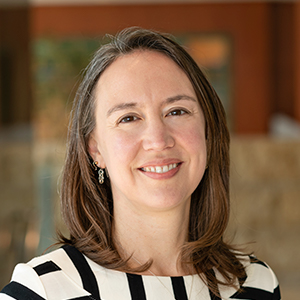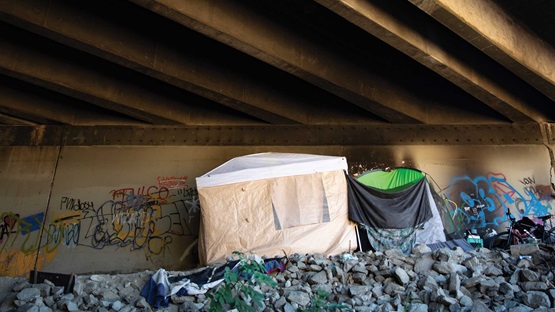
To academics, a finding is usually an output, the conclusion of a lengthy process. A founding goal of the Institute has been to connect researchers with policymakers, analysts, community groups, and the public, introducing research findings into important debates and deliberations. In other words: Make an output an input.
When Institute visiting scholar Marina Mileo Gorzig and co-author Deborah Rho decided to study the impact of a 2020 Minneapolis policy limiting how landlords could screen prospective tenants, “we hoped the results would reach policymakers,” Gorzig said, “but at that point we didn’t have connections to open that dialogue.” So when Gorzig visited the Institute, she was enthusiastic for help scheduling a briefing with five senior Minneapolis city officials.
“I felt we were able to explain a lot of the details of the study they were really interested in,” Gorzig said. The sharing of information went both ways, as Gorzig and Rho learned about how the new policy was enforced from the people tasked with that enforcement. Gorzig now hopes to engage policymakers in dialogue earlier in the process in the future.

Early dialogue was one of the reasons Senior Institute Economist Andrew Goodman-Bacon was keen to join Minneapolis Fed colleagues in Community Development and Engagement in an evaluation of the Minneapolis Guaranteed Basic Income pilot program, which is providing 200 families with $500 a month for two years.
“The partnership with the city allowed us to design the pilot as a randomized control trial—the gold standard of empirical research,” Goodman-Bacon said. That means the researchers can more confidently determine the causal impact of the monthly payments on households’ welfare. They are presenting their analyses to Minneapolis city leaders as well as making them available to the public on the Minneapolis Fed website.

Most economics research takes place outside of formal partnerships, but the people who might benefit don’t typically read the economics journals where findings are published. “My view is that if you’re an academic who’s engaging with research that is policy relevant, it is not going to reach the people it needs to reach unless you actively take steps,” said former visiting scholar Emily Nix. “It’s a shame we don’t do that more, because some of this work is powerful and could help improve policy and people’s lives.”
Nix experienced that impact firsthand. After publishing an op-ed in the Washington Post describing how economic control and coercion often precedes physical violence in abusive relationships, more than 1,500 readers left comments or emailed Nix directly in response.
“I had people who emailed me saying, ‘This has happened to my family member and I wish I had read your article before, because then I would have known that these behaviors are red flags.’”
Economics has a lot to say. Taking time to forge relationships and communicate the findings is necessary to make sure people hear.
This article is featured in the Fall 2023 issue of For All, the magazine of the Opportunity & Inclusive Growth Institute
Lisa Camner McKay is a senior writer with the Opportunity & Inclusive Growth Institute at the Minneapolis Fed. In this role, she creates content for diverse audiences in support of the Institute’s policy and research work.




